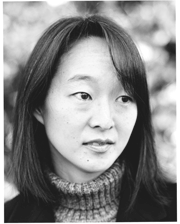S
T A N F O R D ![]() M
D
M
D
Volume 19 Number 1 Winter 2002
| S
T A N F O R D |
| Volume 19 Number 1 Winter 2002 |
 "It
could be that companies "It
could be that companies don't sponsor clinical trials unless they are pretty sure that the outcome will be good" - Bioethicist Mildred Cho |
| An
ethical path As a professional bioethicist, Mildred Cho's work is never done |
| Mildred
Cho, PhD, is friendly, slight and soft-spoken — not the sort of person
you would think could make university presidents or pharmaceutical company
CEOs anxious. Nonetheless, Cho, who received her Stanford PhD in 1992,
has authored a number of widely publicized research papers that do just
that. Examples of her research include findings showing that clinical
trials funded by drug companies show positive results more often than
trials with funds from independent sources and that most universities’
ethics policies are not sufficient to protect the integrity of the institution.
The power of her work is strengthened by the way she presents her findings.
Cho sticks to simple, verifiable facts and when those facts raise uncomfortable
questions, she holds back from suggesting broad remedies or painting any
parties as the bad guys. C0ho’s style is mirrored in many of the
researchers at the Stanford Center for Biomedical Ethics. "The Stanford
center has a heavy emphasis on empirical research," says Cho. "We
don’t have a lot of philosophers here — people tend to come
from a technical background like medicine or biology." Although Cho has followed a standard academic path for a biomedical researcher,
ethical questions intrigued her throughout her career. By chance or by
choice she has always happened to be where the biggest ethical questions
in biological research are being hashed out. For example, Cho was studying
biology as an undergraduate at MIT just when the city of Cambridge, Mass.,
was debating its controversial ban on experiments in genetic engineering.
Later she arrived at Stanford University School of Medicine to study pharmacology
exactly when Stanford researchers were initiating pioneering experiments
in another controversial area: gene therapy. After earning her doctorate in pharmacology, she was awarded a Pew fellowship
in health policy at the University of California-San Francisco. After
that followed another fellowship, at the Center for Health Care Evaluation
at the Palo Alto Veterans Affairs Medical Center, before Cho took a position
at the biomedical ethics center. Demand for Cho’s skills as a bioethicist continues to boom. Nowadays
she finds herself spending many hours in airports and on airplanes, traveling
to attend conferences and meet clients such as the National Institutes
of Health. She enjoys her work but has little time for much else. "What
I really enjoy doing when I’m not working is getting to walk outside
and stand on ground that isn’t covered with concrete," Cho says.
"I have low standards," she jokes. One of the first large projects Cho took part in at the biomedical ethics
center was the group’s study of how tests for the breast cancer genes
BRCA1 and BRCA2 changed the ethical landscape of health care. A complexity
of the issue was that, at the time, there was very little that women who
tested positive for the gene could do to lower their risk of breast cancer,
short of getting preventive mastectomies. The group tackled the question
of whether it was ethical for doctors to recommend that patients get such
tests. "The breast cancer study has been a good model for other genetic
disorders for which we now have tests," Cho says. For instance, she
says, she is studying the implications of a test for a gene that leads
to familial, late-onset deafness. "It’s really not clear what
the medical management strategies should be or even whether the condition
should be considered a disease at all." Another area of study for Cho is how conflicts of interest affect the
conduct of clinical research. She feels that the work she has done merely
opens up the field for more inquiry. Though one of her studies illuminated
a potential problem — that drug trials funded by pharmaceutical companies
were more likely to have positive outcomes — it doesn’t explain
the anomaly. "It could be that companies don’t sponsor clinical
trials unless they are pretty sure that the outcome will be good,"
Cho says. "The frustration in this sort of research is that there
are too many good questions to answer." That frustration is sure to increase as the pace of genetic discovery
accelerates. The sequencing of the human genome and the mapping of important
genetic variations should lead to many new genetic tests, some perhaps
even for genes linked to behavioral characteristics. "We are trying to be anticipatory about how people might be stigmatized
— or not," Cho says. Genetic tests in the future might not only
find genes for disorders, she points out, but might be able to pinpoint
genes that people might be happy to be labeled with, like genes associated
with happiness or intelligence. "We are trying to look at ways in
which genetic labels might result in discrimination but also at ways in
which genetic labels change people’s self-identification." The rapid pace of genetic research also holds the danger that researchers will be tempted to cut ethical corners out of a fear of being left behind by other scientists. That explains why ethicists, Cho says, sometimes get the feeling that they are treated like the "science police." A hopeful sign, however, is that in the last decade most scientists have become more open to working with ethicists on their research projects, she says. "Sometimes a researcher will even come in before he starts a project, when he is just thinking about it, to talk about what he wants to do. That never would have happened 10 years ago." SM |
|
|
Home |
|
This document was last modified:
Wednesday, 31-Dec-1969 16:00:00 PST
|
|